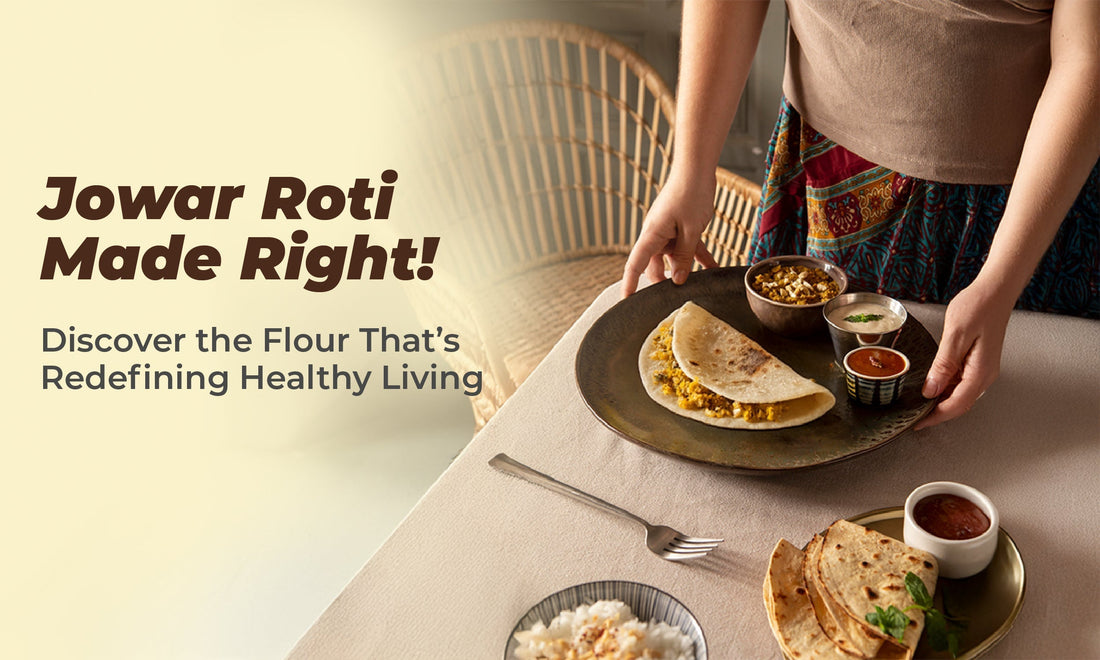Jowar Roti: Benefits, Nutrition, and Calories—Your Complete Guide!
Info Organic 5 min read
When it comes to wholesome and healthy eating, Jowar Roti takes centre stage as a versatile, nutritious, and gluten-free alternative to wheat-based bread. Made from jowar atta (sorghum flour), this humble flatbread has been a staple in Indian households for generations.

Popularly known as jowar bhakri in many regions, Jowar Roti is celebrated for its myriad health benefits, making it a preferred choice for those looking to maintain a balanced diet or manage health conditions like celiac disease. But what exactly makes this cereal-based roti so special? Let’s dive into its nutritional profile, calorie content, benefits, and even learn how to make soft jowar ki roti at home.
Table of Contents
- Nutrition in 100g of Jowar
- How Many Calories Are in One Jowar Roti?
- 10 Benefits of Jowar Roti
- How to Make Soft Jowar Roti at Home
- Bottom Line
- Frequently Asked Questions
Nutrition in 100g of Jowar
Jowar, scientifically known as Sorghum bicolor, is a powerhouse of nutrients. Here’s what you can expect in 100g of raw jowar flour:
- Calories: 349
- Proteins: 10.6 g
- Dietary Fiber: 6.7 g
- Carbohydrates: 72.1 g
- Fats: 3.46 g
- Iron: 3.36 mg
- Calcium: 13 mg
- Sodium: 2 mg
- Magnesium: 165 mg
- Vitamin B Complex: Abundant in niacin, thiamine, and riboflavin
Note: These are standard nutritional values for raw jowar flour and may vary. For accurate details, please refer to the product’s nutritional chart.
This nutrient-dense profile underscores why Jowar is revered as a whole grain that supports overall health and wellness. Jowar flour is rich in complex carbohydrates, protein, and dietary fiber, making it a filling and nutritious choice.
The presence of iron, magnesium, and calcium further enhances its benefits, contributing to better bone health, energy levels, and overall well-being.
Compared to wheat, jowar, an organic cold-pressed atta, provides more fiber and is ideal for those aiming to manage blood sugar levels or looking for a gluten-free alternative in their diet. This highlights the importance of nutrition in jowar roti for anyone seeking a nutrient-rich, healthy option in their meals.
How Many Calories Are in One Jowar Roti?

One medium-sized jowar roti (approximately 5 inches in diameter and weighing around 43g) contains approximately 50 calories. These calories in jowar roti break down as follows:
- Carbohydrates: 41 calories
- Proteins: 6 calories
- Fats: 3 calories
This makes jowar roti a relatively low-calorie option, especially compared to traditional wheat chapatis. If you're counting 1 jowar roti calories, it's a great way to enjoy a filling, yet low-calorie meal.
In fact, a single jowar roti provides about 2% of the daily calorie requirement of a standard 2000-calorie adult diet. So, if you’re watching your calorie intake or managing your weight, jowar roti can be a healthy and satisfying choice.
If you’re calculating jowar roti calories per 100g, the count ranges between 220–240 calories for cooked rotis, depending on preparation methods.
10 Benefits of Jowar Roti

Now, let’s uncover the remarkable health benefits of jowar roti that make it a must-have addition to your diet.
Gluten-Free Goodness
One of the key benefits of eating jowar roti is that it's naturally gluten-free, making it an excellent choice for those with celiac disease or anyone sensitive to gluten. This makes it a perfect alternative to traditional wheat flour, providing a safe and wholesome option for those who wish to enjoy baked goods and other flour-based dishes without the discomfort gluten can cause.
Whether you’re looking to make a gluten-free pizza crust, flatbread, cheela, or dosa, this versatile flour can replace wheat in most recipes, providing both nourishment and peace of mind.
Helps Regulate Blood Sugar
Jowar roti is known for its low glycemic index, which means it helps regulate blood sugar levels by providing a slow, sustained release of energy. This is especially beneficial for individuals managing diabetes, as it prevents spikes in blood sugar, promoting steady energy throughout the day.
Unlike wheat or other high-glycemic foods, jowar releases glucose gradually, preventing rapid spikes or crashes in blood sugar. By incorporating jowar flour into your diet, you can enjoy a heart-healthy, low-sugar meal that promotes consistent energy and better blood sugar control.
Supports Healthy Cholesterol Levels
Another of the notable advantages of jowar roti is its ability to help lower bad cholesterol (LDL) while promoting higher levels of good cholesterol (HDL). The natural fiber and antioxidants in jowar atta have been shown to reduce cholesterol levels, which is crucial for maintaining cardiovascular health. By incorporating jowar roti into your diet, you are taking a step toward lowering your risk of heart disease and supporting overall heart wellness.
Rich in Dietary Fiber
Maintaining a healthy heart is crucial, and jowar roti can support this by helping reduce cholesterol levels, thanks to its high fiber content. The antioxidants in jowar atta also help combat oxidative stress, which is essential in reducing the risk of cardiovascular diseases and supporting overall heart health.
Aids in Digestive Health
Good digestion is at the core of a healthy body, and the high fiber content in jowar roti supports this by improving gut health. The fiber helps maintain regular bowel movements, prevents constipation, and aids digestion, while also promoting a healthy gut microbiome.
The nutrition in jowar roti is essential for overall well-being, ensuring that the digestive system functions optimally. By consuming jowar flour regularly, you are giving your digestive system the support it needs to function at its best.
Strengthens Bones
Another remarkable benefit of jowar roti is its richness in phosphorus, a mineral that works alongside calcium to build and maintain strong bones. This makes jowar atta roti a great addition to your diet if you're looking to enhance bone strength and prevent conditions like osteoporosis. Phosphorus, combined with the minerals found in jowar, supports bone health and encourages the regeneration of bone tissue, helping to keep your bones healthy as you age.
Aids in Weight Loss
If weight management is a priority for you, jowar roti can be a valuable ally. As a complex carbohydrate, jowar atta provides sustained energy throughout the day, helping to keep hunger at bay.
Its high fiber content also aids in controlling portion sizes by promoting feelings of fullness and satiety, preventing overeating and unhealthy snacking. Jowar roti is a great choice for anyone looking to maintain a healthy weight while still enjoying satisfying meals.
Supports Eye Health
Integrating jowar atta roti into your diet can benefit your eyes as well. The presence of antioxidants such as vitamin E and zinc in jowar flour contributes to maintaining healthy and clear vision and protecting the eyes from oxidative stress.
These nutrients, alongside magnesium and copper, help maintain overall eye health and function, reducing the risk of age-related eye conditions. This makes jowar roti not just good for your digestion but for your vision as well.
Reduces Inflammation
One of the lesser-known benefits of jowar roti is its ability to reduce inflammation in the body. Jowar flour contains phytochemical antioxidants that act as natural anti-inflammatory agents.
These antioxidants help combat oxidative stress, which is linked to the development of chronic diseases like heart disease, cancer, and arthritis. By regularly consuming jowar atta, you can help reduce systemic inflammation, leading to improved overall health and a reduced risk of long-term illness.
Combats Anaemia
Anaemia is a common condition that can lead to fatigue and weakness. One way to help combat this condition is by including jowar roti in your diet.
Jowar atta is rich in iron, which plays a key role in the production of haemoglobin and the transportation of oxygen throughout the body. By eating jowar roti, you can help increase your iron intake and improve your haemoglobin levels, reducing the risk of anaemia and promoting overall vitality.
How to Make Soft Jowar Roti at Home
Making jowar atta roti can seem challenging due to its lack of gluten, but with the right technique, you can achieve soft and pliable rotis.
Ingredients:
- 1 cup Jowar Flour
- Hot water (as required)
- A pinch of salt (optional)
Steps:
Knead the Dough: Heat water until warm but not boiling. Gradually add it to the jowar flour while kneading until you get a smooth, pliable dough.
Shape the Rotis: Divide the dough into small balls and roll each into a circle using a rolling pin or your hands. Sprinkle jowar flour to prevent sticking.
Cook on a Tava: Heat a tava (griddle) and cook the roti on medium heat. Flip it a few times until it puffs up and gets golden brown spots. Serve hot with curry or chutney.
Pro Tip: If your jowar roti breaks while rolling, add slightly more water to the dough. Mastering how to make jowar roti without breaking requires practice and patience!
Bottom Line

Jowar Roti is not just a meal—it’s a lifestyle choice for those seeking better health through mindful eating. From its nutrient-rich profile to its countless health benefits, jowar atta roti has earned its place in modern diets. Whether you're managing cholesterol, controlling blood sugar, or embracing a gluten-free lifestyle, jowar roti offers the perfect balance of taste and nutrition.
So, why wait? Take a step towards holistic nourishment today. Embrace the goodness of organically-processed jowar flour from AsmitA Organic Farms and enjoy the many benefits of this ancient grain. Buy now and make jowar roti a part of your healthy, balanced diet!
Frequently Asked Questions
Is jowar roti healthier than wheat bread?
Yes, jowar roti is a healthier option as it is gluten-free, higher in dietary fiber, and has a lower glycaemic index compared to wheat bread. This makes it easier to digest and a better choice for those with gluten sensitivities or managing blood sugar levels.
What are the main advantages of jowar roti?
Jowar roti offers numerous health benefits, including promoting digestion, helping regulate blood sugar, supporting weight loss, and boosting heart health. It’s a nutrient-dense option that complements a balanced diet.
Can I make jowar chapati without a rolling pin?
Yes, it’s possible to shape jowar chapati without a rolling pin. Simply use your hands to gently pat the dough into a round shape, ensuring it's evenly flattened. This method works well if you're looking for a more traditional approach.
Is jowar atta roti suitable for children?
Absolutely! Jowar atta roti is packed with vitamins and minerals that support growth, strengthen the immune system, and contribute to overall well-being in children. It’s a great addition to their diet for sustained energy.
How many calories are in 1 jowar roti?
One medium-sized jowar roti, typically weighing 43g, contains approximately 50 calories. The calories in jowar roti can vary depending on its size and the method of preparation, but it remains a relatively low-calorie option for those aiming to maintain a balanced diet.
Disclaimer: The nutritional values, calorie counts, and benefits mentioned in this article are based on standard data and may vary depending on the brand of jowar flour, preparation methods, and serving sizes. Please consult a nutritionist or healthcare professional for personalised dietary advice.

